#nuclear family
Note
I understand what people mean by prison abolition, but what does it mean in practice to abolish the family? I've never quite got it - who is raising children? How does it work? I'm asking in good faith, I've just always been a bit embarrassed to ask anyone
Like positions that are “anti-work” or against “gender,” the thing being objected to is more detailed and specific than the range of meanings that can reasonably or semi-reasonably be assigned to the word in question (“work,” “gender,” “family”)—which is why these propositions and programmes can have a bit of a PR problem. And, as with all terms that position themselves against something (e.g. "anti-psychiatry"), the term "family abolition" can be taken up by people with a range of different positions who disagree amongst themselves on some issues. In general, though, no one objects to "people living together or being emotionally close to each other" or "children not being left to roam about at random and get eaten by wolves" or anything.
Rather, anti-capitalist objections to "the family" tend to hinge on objections to:
parental rights, or "the special legal powers of parents to control major aspects of their children’s lives," which function as "quasi-property interests" more than anything that is in the best interest of children (link explicitly relates to U.S. law). Parents legally control where their children live, whether and where they go to school, what information they have access to, what level of freedom of mobility they have, what medical care they receive and don't receive, and what they may do with their own bodies, and are legally allowed to physically assault their children.
relatedly, the lack of legal autonomy that children possess (this is also often discussed under the banner of "children's rights" or objections to "adultism").
the positioning of "the family" as the only economic or social "safety net" in an economy and a society which provide no other one (creating an artificial "structural scarcity" of care). In a society which is otherwise dominated by "economic competition between atomized individuals," the family must be relied on—and yet, for some people (whose families cannot or will not provide living space or financial support in an emergency; whose families are abusive and physically or psychically dangerous to be around or rely on; who will not receive help or emotional support from a spouse or family unit without making serious concessions on the level of their personhood being basically respected; Black working-class people in whose communities the nuclear family unit has been deliberately prevented from forming by government intervention), the family cannot be relied on.
the way that the positioning of "the family" as the only safety net therefore constitutes economic coercion that works to keep people (especially women and LGBT, disabled and/or transracially adopted people) in abusive or exploitative situations, and that works to create incentives for working-class women (whose employment is generally less secure) to make themselves erotically desirable to men & disincentives for doing anything else.
the idea that housework, gestational labour & childbirth, and childcare are tasks "naturally" falling to the "mother" ("mother" as a "natural category"), such that the social, political, and economic nature of these tasks, and the economic and political discourses that mobilise the creation of our concept of "motherhood," are obscured.
Thus the objection is to "the family" as a unit of social reproduction under capitalism—as a legal, political entity that structures inheritance, taxes, health insurance, "race" and ethnicity, &c., and therefore works as a sort of interface between the capitalist state and the individual.
So the programme of "family abolition" involves, firstly, the control of the means of production on the part of the proletariat (this is a communist programme—the point isn't to remove the safety net of the family while keeping capitalism in place, but rather the idea is that without capitalism this ultimately abusive safety net ought not to be needed); and then the abolition of marriage as a legal institution; the abolition of parental rights; the putting in place of measures for the elderly and disabled to be cared for regardless of whether they have family alive who are both able and willing to care for them; the forming of social networks at will; and, depending on who you ask, the communal raising of children (which involves ceasing to privilege "parent" as a legal title automatically conferred upon biologically creating a child).
Obviously, toddlers who do not yet understand things about the world including "causation" and "mortality" will need on occasion to be restrained from running blithely into the jaws of wolves &c. The argument is just that coercion of this sort should be legitimately in the best interests of the child; not performed by two people who need answer for their actions, up to and including battery of their children, in no way other than saying that they "plausibly believe this to be necessary to control, train or educate their child"; and walked back in measure as the child gains the ability to assert their own desires.
Probably no one has a perfect solution 100% worked out—life is messy, and we don't know what the future will look like—but having a perfect solution 100% worked out should not be a prerequisite for noticing that the current situation is abusive and untenable.
923 notes
·
View notes
Photo
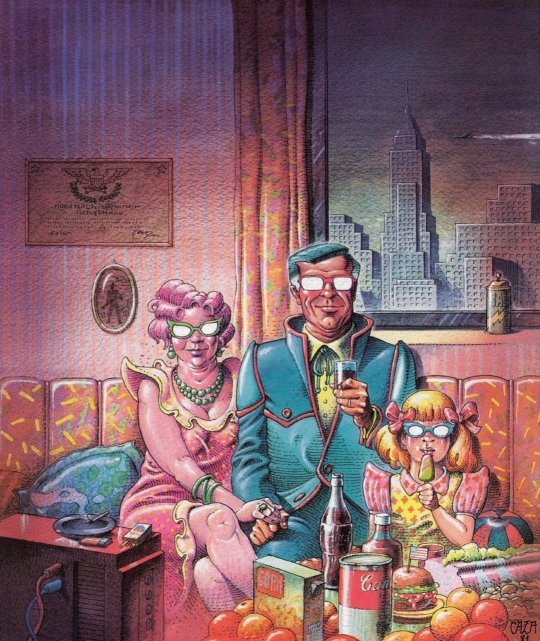
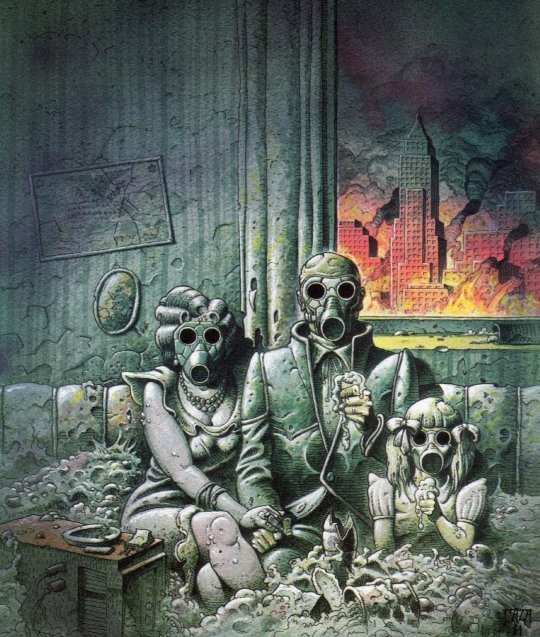
Nuclear Family (1981) by Philippe Caza
#Philippe Caza#art#artwork#painting#Nuclear family#nuclear power#post apocalyptic#post atomic bomb#atomic bomb#destruction#atomic explosion#Illustration#80's#80s#nuclear fear#family#devastation#ruins#ruin#decay
1K notes
·
View notes
Text
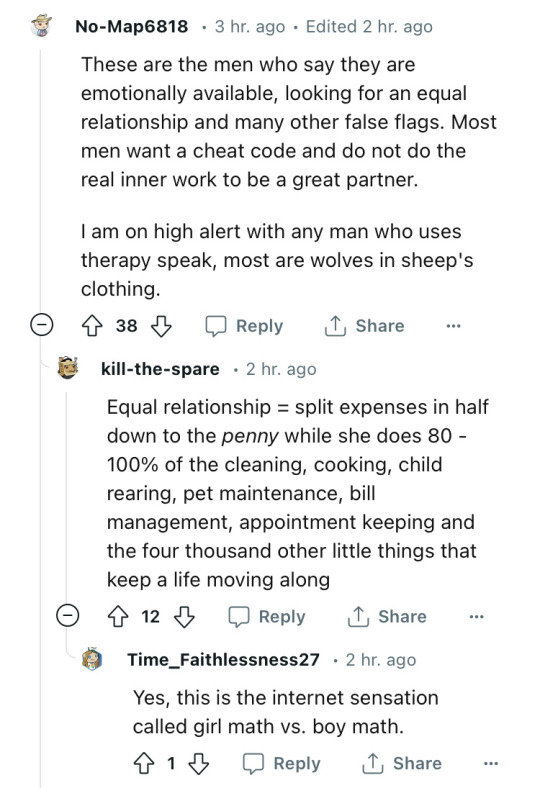
When does boy math become manflation?
#feminism#compulsory heterosexuality#heterorealism#gender socialization#gender inequality#family#nuclear family#tw abuse
164 notes
·
View notes
Text
FUCK rigid traditional gender norms and the nuclear family all my real ones HATE traditional gender norms and the nuclear family
I am deadly passionate about the fact that kids should be raised and surrounded by significantly more people than just their parents.
Your job as a parent isn’t to shield your kids from every bad thing in the world, it’s to make sure they’re strong enough to handle the bad things in the world when the time comes for it. Sometimes that involves making sure kids are reasonably sheltered from things that they genuinely don’t have the capacity to deal with yet and introducing things to them more slowly, but giving your children a complex about innocence and purity will ALWAYS fuck them up.
Withholding affection from your child in an attempt to make them stronger will ALWAYS give them problems. Allowing your children to experience hardship and introducing them to the harsh realities of the world WHILE providing affection and support and being a strong figure in your child’s life WILL help them in the long run.
Make sure your child has a wide range of people and experiences to judge and look at in order for them to better come to their own conclusions about themselves and the world. Isolating your child will ALWAYS hurt them more than help them.
Being a parent in a nuclear family desperately trying to shield and preserve your child’s innocence is bad parenting.
58 notes
·
View notes
Text
In early patriarchy, women's ancient community tasks were turned into slave labor. Women produced the surplus products on which men based their secular power and control. In the next stage of economic development these slave tasks became the industrial occupations of the workers, while the ruling men (and their "wives") were exempt from labor. The ruling men reserved for themselves the "manly" occupations of war, hunting, sport, and priestly observances—while "workers" kept the world going. Women's forced labor, and later working-class labor, freed elite males to become lawyers, judges, doctors, artists, priests, and warriors—specialized, privileged occupations that all others are barred from. And whole bodies of law, religious doctrine, and custom are then assembled to forcibly maintain these men in these positions of power. Patriarchal law, often called "the Will of God," is in fact a wholly secular cynical legal system designed purposely to maintain male power through institutional control of female energy. Under patriarchal legal, religious, and economic-social systems, some men dominate others. But all men benefit from their organized domination of the community of women.
Which is no longer a community. Patriarchy breaks up the female collective by forcibly capturing and imprisoning each woman's female energy within the patrilocal family. Within this isolation cell, each woman's creative energy becomes servant energy, directed and owned by men. In the Hindu Code of Manu—typical of all patriarchal family law—the woman must never be free, from birth to death, of subjugation to a male relative. She passes from the guardianship of her father, to that of her husband, and finally to her oldest son. They control her education, her property, the total disposal of her mind and body, in life and in death. The ignobility of this male obsession with control is equalled only by its effectiveness. Under the Code of Manu, the Hindu woman becomes a nonperson. The breaking up of the powerful ancient women's collectives was the only way by which men could have broken women's strength and independence—but still keep a vaguely living body around to do the dirty work in bed and bathroom. What better way to turn the Great Goddess into a sex-serf than by isolating each individual woman, keeping her under total control within the male-dominated and defined family household—where she is never allowed freedom of movement, of thought, of desire—where her body, her mind, her labor, and her children are seen as property, wealth belonging to the man. Where the only thing she can do with her sex-serfdom is pass it on conscientiously to her daughters.
-Monica Sjöö and Barbara Mor. The Great Cosmic Mother: Rediscovering The Religion of the Earth.
167 notes
·
View notes
Text
Song messages in the deluxe version of the ¡Uno! book
Nuclear Family

'Pick a summer... and summer... take a peek at the salt water and who gives a fuck... ya know? That's where this begins'
Stay the Night
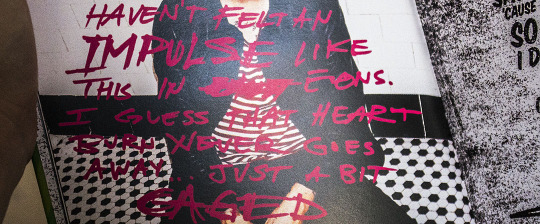
'Haven't felt an impulse like this in eons. I guess that heart burn never goes away... just a bit caged'
Carpe Diem

'"Too young to die?" Well I say "aren't all too young to die?" Does the future have enough time to live in the moment?
Let Yourself Go

'How much can I pay you not to finish your story? You keep telling the same story over & over & over & over & over & over & over punch me in the fucking face!'
Kill the DJ

'Ah yes, which leads us to this 4 on the floor. Sometimes I could drink my way through this era. Take pills & fuck the noise away. And dance in the ashes of nonsense.'
Fell For You
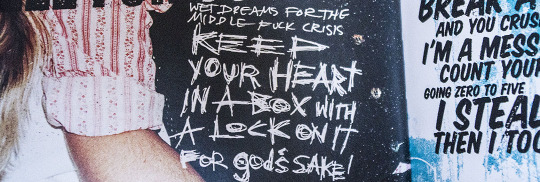
'Wet dreams for the middle-fuck crisis. Keep your heart in a box with a lock on it for god's sake!'
Billie Joe also said something similar on the closing night of American Idiot on Broadway: 'Keep your fucking heart young, goddammit. Keep it fucking all comfy all the time. Don’t fucking stop, there’s a reason why that hand is holding the heart. It just keeps squeeze that motherfucker till it still bleeds every goddamn day.'
Loss of Control

'Look how far we've come.'
Troublemaker

'✓ Beach ✓ Douchebags ✓ Sluts ✓ Bars ✓ Tattoo shops. How convenient!'
Angel Blue

'It's better to just rip the band-aid off'

'Baby has barely started!'
Sweet 16

'I remember you drinking Olde English driving all the way out. Sunbathing at Pinole Shores. My Minnesota Girl. Always.'
Rusty James

'I read your book... it was a piece of shit. You traded that spiked belt in for a killer job at Pete's Coffee. Way to go! By the way, I've always wanted to smash your fucking teeth in. 🖤'
Oh Love
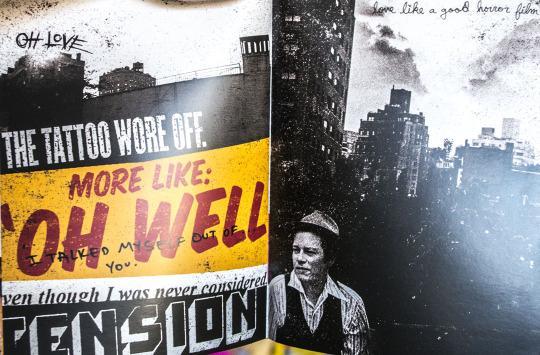
'Love like a good horror film.' / 'The tattoo wore off. More like "Oh well." I talked myself out of you. Even though I was never considered. Tension.'
#green day#uno dos tre era#uno#uno dos tre#trilogy#song meanings#quotes#lyrics#nuclear family#stay the night#carpe diem#kill the dj#let yourself go#fell for you#loss of control#troublemaker#angel blue#oh love#rusty james
20 notes
·
View notes
Text
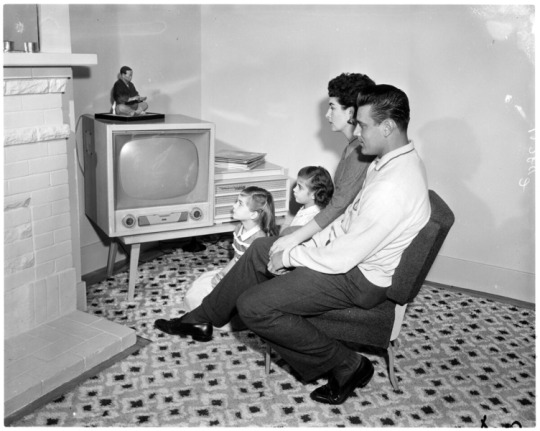
Family watches blank TV screen. Los Angeles Examiner Photo Collection. January 27, 1958.
USC Libraries
204 notes
·
View notes
Text
Aang had no business getting married
If he was truly serious about preserving his air nomad culture - one that seemingly espoused a non-possessive social style - getting married and raising kids in a nuclear-family set up is the exact OPPOSITE of what he should have been doing
And because he did that, he set his kids up for a lifetime of guilt and resentment and emotional hangups, and likely put Katara through a fuckton of unnecessary stress to “provide” airbenders for him.
Truly one of the rare moments where “knock up a bunch of different women (CONSENTUALLY)” was the probably the correct and appropriate thing to do
But that probably would’ve scared the poor WASP-y executives at Nickelodeon so ¯\_( ಠ_ಠ)_/¯
#avatar#avatar the last airbender#aang#avatar aang#katara#bumi ii#tlok kya#tenzin#air nomads#monk gyatso#nuclear family#family dynamics#family dysfunction
28 notes
·
View notes
Text

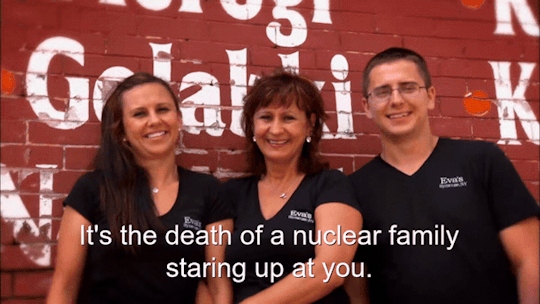
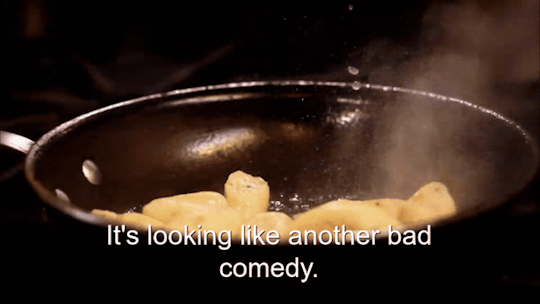
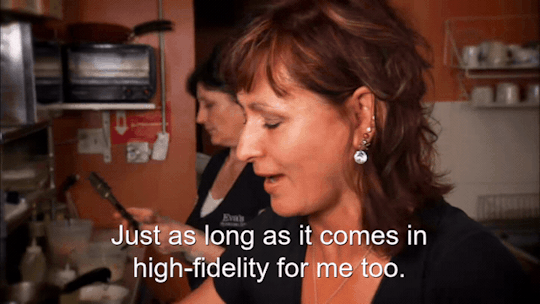
[Like a Chinese drama and conspiracy. It's the death of a nuclear family staring up at you. It's looking like another bad comedy. Just as long as it comes in high-fidelity for me too.]
#s16e09 eurocentric#guy fieri#guyfieri#diners drive-ins and dives#chinese drama#nuclear family#bad comedy#conspiracy#death#high-fidelity
19 notes
·
View notes
Text
Fifty years ago, 15-year-old Sonia Yaco ran for the school board in Ann Arbor, Michigan, one of the youngest people in the country ever to run for a seat on the Board of Education. A member of a group called Youth Liberation, whose platform was founded in 1970, she believed schools would be best run by the people required to be inside them for about seven hours a day, 180 days a year.
Youth Liberation developed a 15-point platform that was far-reaching in its vision. In addition to calling for an end to sexism, sexual discrimination, class antagonism, racism, colonialism, and what they called “adult chauvinism,” the group wanted to form communities outside the structure of the nuclear family, live in harmony with nature, abolish juvenile detention centers and mental institutions, establish global solidarity with youth all over the world, be free of economic dependence on adults, and have the right to their own “new culture,” which included everything “from music and marijuana to free clinics and food cooperatives.”
The 20 or so young people in the group, ranging in age from 12 to 16, wanted “a nationwide movement for youth civil rights, akin to the Black Liberation movement and the growing women's movement,” one of the founders, Keith Hefner, later wrote.
—
🚨 want more materials like these? this resource was shared through BFP’s discord server! everyday, dozens of links and files are requested and offered by youth around the world! and every sunday, these youth get together for virtual teach-ins. if you’re interested in learning more, join us! link in our bio! 🚨
#resources#youth liberation#organizing#community#adultism#childism#kids#black liberation#civil rights#environmentalism#colonialism#abolition#nature#nuclear family#family abolition
43 notes
·
View notes
Text
"The house wife is an unpaid employee in her husband's house in return for the security of being a permanant employee."
Germaine Greer
#nuclear family#het critical#radfem#radblr#radical feminists please interact#radical feminist community#radical feminism#intersectional feminism#feminism
250 notes
·
View notes
Note
“poverty we have in favour of abundance we have yet to organise” i fundamentally disagree. Its fundamentally impoverishing to take away child from their carers and give them to a bunch of strangers. if thats not whats going to happen what is exactly? so far all i read is a dystopian nightmare and people saying “but no it will be great i promise”
[regarding this post and broader recent discussion of family abolition]
I'm getting a lot of responses in this same emotional valence (as does anyone who talks about "family abolition," and again, this is the exact emotional response which Sophie Lewis preëmpts and responds to at the beginning of Abolish the Family)—I'm chusing this message to respond to not to pick on you specifically but to try to unravel some of the assumptions that underlie this objection.
1.
I did my best to outline some of the major actionable demands of a programme of family abolition and include links to further readings that laid each of these demands out, including the abolition of parent's property rights over children & freedom to mete out "corporal punishment," the end of social and economic dependence on the family that works to impoverish 'family outcasts' or to force them into abusive situations, &c.
Yet, amongst all of these things, the questioning of the naturalness of the social/economic/legal/political category of "mother" (and investigation of how the category is sexed, gendered, & racialised) is what draws the most ire, and commonly the only thing that is responded to in people's objections to "family abolition"—as though it is the weakest part of the argument, and not the conclusion we necessarily come to through an understanding of the economic and social position of the "wife," the "single mother," the "single woman," &c.
What about the affective / emotional nature of the presumed "naturalness" of the mother relation causes the questioning of it to meet with such a disproportionate amount of resistance? Could we understand this individual emotional attachment to the concept of motherhood and its positioning as "natural" to be part of, or a result of, the naturalizing work that discourses about femininity and labour* do?
2.
Where does this spectre of an infant being "taken away from" its biological parents (actually, and tellingly, "mother" far more often than "parents") come from, and why does it keep being dragged forth? Communal raising of children is indeed part of the speculative programme for (most?) people who advocate for the abolition of the "family," but what part of that entails that a child must not be raised in part by, or anywhere near, their biological parents?
If no family abolitionist is saying that every child ought to be reassigned to some other random communal housing unit immediately upon birth (and, if anyone is, I have yet to come across it!), why is this the image that is brought up repeatedly in response to arguments for family abolition, as though the image is 1. an argument in itself, that 2. meaningfully responds to the programme being put forth? In what inheres the shocking nature, the emotional effectiveness, of this image? What assumptions and attachments does that effectiveness reveal?
3.
You've said that it is "fundamentally impoverishing" to a child for them to be "take[n] away" from "their carers" and "give[n] to a bunch of strangers." You haven't laid out how we can determine who a child's "carers" are—the "carers" fundamentally, properly, 'rightly' belonging to the child in your grammatical construction (in fact, in terms of property law, we ought to say the people the child belongs to—and we can see this arrangement reassert itself in your use of the word "give").
Incredibly, "carer" seems here to mean something other than "the people who are caring for the child"! "Stranger," similarly, must mean something other than "people the child has never had contact with," since in this fantasy these are the people who are raising the child... So if "carer" doesn't mean "person who cares for," and "stranger" doesn't mean "person who is strange," then where do these labels come from? What assumptions are you recreating when you use them in this frankly counter-intuitive sense with the assumption that I will know what you mean? (See also a message I got reading "i am not a mother but i already know i would rather die than have my baby call some strange women mom," emphasis mine.)
I think that probably you've used "carer" because you know that "biological parent" is a weaker proposition—and yet, in regards to the legal structures I'm talking about, it is biological parenthood which confers automatic, presumptive "rights" over a child upon someone (in default of other specific legal arrangements which someone must chuse to enter into in order to renounce those automatic, presumptive rights).
It is the idea that biological parenthood (or adoption, or "using" a surrogate, or any of the arrangements people may enter into that fall between these categories) ought to give one or two people complete control over another human being, such that that human being has no recourse at all from abuse, coercion, forced isolation, being raised in a cult, being denied transition or other medical care or put through conversion therapy, &c., so long as their caretakers do not in theory fall afoul of the very high standard of legal "child abuse" in a way that someone in practice actually cares to pursue—it is this reality, which is ideologically baked into your assumption of who a child's natural, automatic "carers" are for them to be "taken away from" in the first place, that family abolitionists want to change.
But nothing about biological parents no longer having automatic, presumptive rights to do basically whatever they want with or to their children automatically means that children will be taken away from them in the sense of enforced physical distance!
I think we need to look at what is ideologically entailed in assuming that a) parenthood in which a parent does not have quasi-property rights over their child is not "real, natural" parenthood, such that removing "parental rights" equates to "taking a child away"; b) certain people are just inherently strangers or strange to a child by virtue of the circumstances of their birth in relation to the circumstances of the child's birth, regardless of the actual social relationship they have with that child, and the ways in which this division between "naturally connected" versus "naturally distant," "natural proper and correct" versus "naturally strange," "inside" versus "outside," and the concept of the "stranger" (and the foreigner as the "eternal stranger," the racialised as the "eternally foreign") play into a situation where you can say "a bunch of strangers" and assume that you will be understood, and that this will be understood to be obviously bad.
*E.g., women are naturally caretakers, having a child is naturally the ultimate fulfillment for any woman (thus women who do not or cannot give birth are not fulfilling their function or are not "really" women), women love and are never exhausted by any aspect of gestation, childbirth, or childcare and they certainly don't need any help, &c.
#trying something different with the structure so that I can make something like a bullet-pointed list but include paragraph breaks#that don't indicate a new bullet point#family abolition#nuclear family#questions
324 notes
·
View notes
Photo
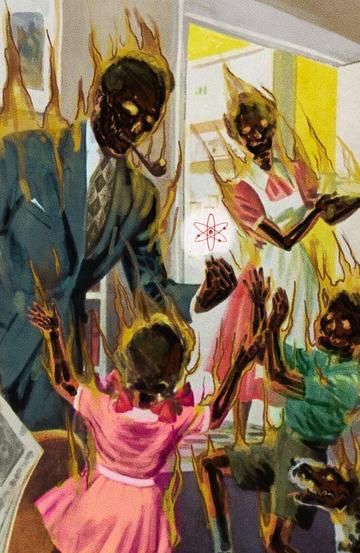
Nuclear Family #1 by Neil Nelson
#Nuclear family#neil nelson#art#painting#family#nuclear explosion#post-punk#atomic bomb#nuclear attack#artwork#illustrations#Illustration#devastation#destruction#dead#death
532 notes
·
View notes
Text
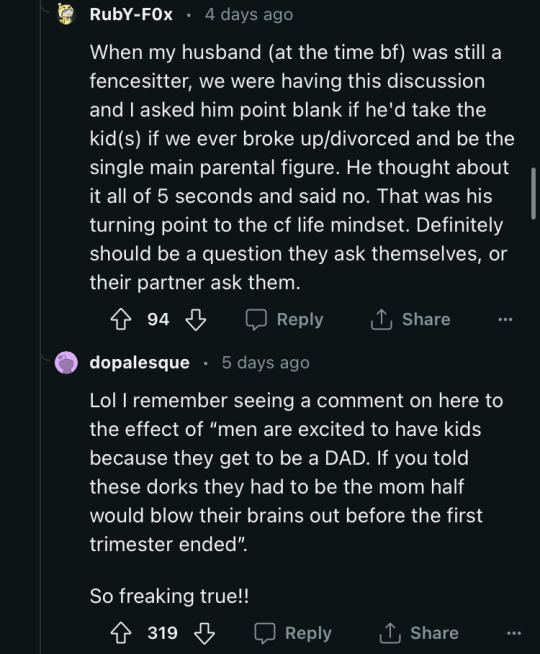
#heterorealism#gender#feminism#dating memes#wages for housework#men aint shit#dating#family#nuclear family#heteropessimism
137 notes
·
View notes
Text
I like to think that blaze has a whole royal family that she never talks about and rarely talks too because her pyromancy makes her feel alienated but she is still next in line so they all have to awkwardly deal with each other.
Blazes mom: so I heard that you went on quite a adventure getting the scepter back you even made some new friends including this "little peasant girl" that you've brought to tonight's dinner?
Marine: sup mate
Blaze awkwardly playing with her food: yeah she's like my best friend now and one of the 4 people in this dimension that I wouldn't feel comfortable immolating
Blazes sibling: am I one of those 4 people?
Blaze: [sighs] with all do respect no you are not one of those people
51 notes
·
View notes
Text
Cinderella's father saw her every day. He saw her picking lentils out of the ashes, dressed in rags, degraded, insulted. He was a good man.
The father of Hansel and Grethel also had a good heart. When his wife proposed to him that they abandon the children in the forest to starve he protested immediately—"But I really pity the poor children." When Hansel and Grethel finally escaped the witch and found their way home "they rushed in at the door, and fell on their father's neck. The man had not had a quiet hour since he left his children in the wood [Hansel, after all, was a boy]; but the wife was dead." Do not misunderstand—they did not forgive him, for there was nothing to forgive. All malice originated with the woman. He was a good man.
Though the fairy-tale father marries the evil woman in the first place, has no emotional connection with his child, does not interact in any meaningful way with her, abandons her and worse does not notice when she is dead and gone, he is a figure of male good. He is the patriarch, and as such he is beyond moral law and human decency.
The roles available to women and men are clearly articulated in fairy tales. The characters of each are vividly described, and so are the modes of relationship possible between them. We see that powerful women are bad, and that good women are inert. We see that men are always good, no matter what they do, or do not do.
We also have an explicit rendering of the nuclear family. In that family, a mother's love is destructive, murderous. In that family, daughters are objects, expendable. The nuclear family, as we find it delineated in fairy tales, is a paradigm of male being-in-the-world, female evil, and female victimization. It is a crystalization of sexist culture—the nuclear structure of that culture.
-Andrea Dworkin, Woman Hating
36 notes
·
View notes